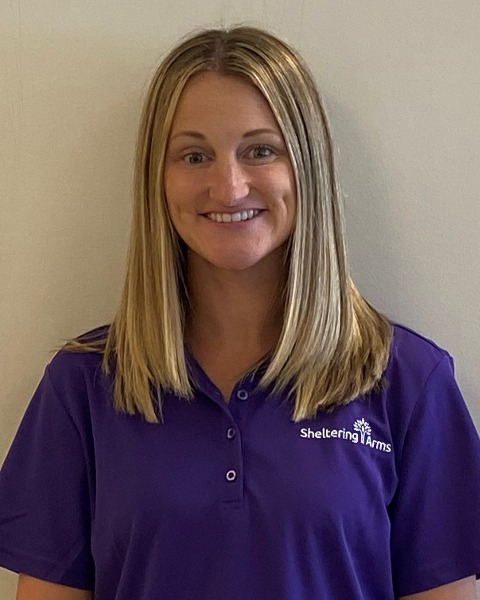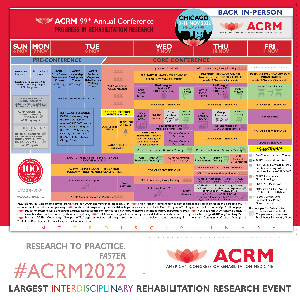Back
Brain Injury
Efficacy of Computerized Visual Tracking Technology Throughout Concussion Recovery: A Case Series
Wednesday, November 9, 2022
10:17 AM – 10:22 AM
Location: Station 3

Paige E. Carroll, PT, DPT, CBIS, CertDN
Physical Therapist
Sheltering Arms Institute
Moseley, Virginia, United States
Presenting Author(s)
Research Objectives: To compare results of computerized eye tracking assessments to concussion patient reported outcomes and other objective oculomotor function tests throughout the concussion recovery.
Design: Retrospective case series of three physical therapy plan of cares completed between April 2021 and September 2021.
Setting: Outpatient physical rehabilitation clinic
Participants: Included three female patients (mean age 34.7 years). Brain injury conditions vary from sub-acute to chronic. Selected via volunteer sample.
Interventions: Manual therapy, postural stabilization, aerobic conditioning, ocular motor training, and balance exercises. Average physical therapy visit count of 15.3.
Main Outcome Measures: RightEye™ Dynamic Vision Test, Concussion Clinical Profile Screen (CCPS), Clinical Dynamic Visual Acuity (DVA), Somatosensory Organization Test (SOT), and Vestibular Ocular Motor Screen (VOMS)
Results: All final RightEye™ composite scores declined or had minimal change compared to evaluation scores. Initial VOMS similar findings to initial RightEye™ subdomain scores. CCPS composite and ocular profile scores improved with each re-assessment. Clinical DVA scores improved and within normal limits at final assessments. 2/3 of participants had normal composite scores on SOT at re-evaluation.
Conclusions: In this case series subjective recovery of concussion symptoms did not correlate with performance on computerized ocular motor assessments. There were conflicting results on several other objective tests compared to results of RightEye™ Dynamic Vision Test. Some confounding factors that may have impacted scores are co-morbidities of cervical pain, anxiety, depression, and migraine. Even though the assessments did not correlate, it is important to note the tracking assessments and games were engaging and offered repetition. In conclusion, clinicians should not rely on one single measurement for concussion screening and determination of readiness for return to prior activities. More research is needed to determine the efficacy of computerized visual tracking assessments for individuals with complex medical history and post-concussion.
Author(s) Disclosures: The author has nothing to disclose.
Design: Retrospective case series of three physical therapy plan of cares completed between April 2021 and September 2021.
Setting: Outpatient physical rehabilitation clinic
Participants: Included three female patients (mean age 34.7 years). Brain injury conditions vary from sub-acute to chronic. Selected via volunteer sample.
Interventions: Manual therapy, postural stabilization, aerobic conditioning, ocular motor training, and balance exercises. Average physical therapy visit count of 15.3.
Main Outcome Measures: RightEye™ Dynamic Vision Test, Concussion Clinical Profile Screen (CCPS), Clinical Dynamic Visual Acuity (DVA), Somatosensory Organization Test (SOT), and Vestibular Ocular Motor Screen (VOMS)
Results: All final RightEye™ composite scores declined or had minimal change compared to evaluation scores. Initial VOMS similar findings to initial RightEye™ subdomain scores. CCPS composite and ocular profile scores improved with each re-assessment. Clinical DVA scores improved and within normal limits at final assessments. 2/3 of participants had normal composite scores on SOT at re-evaluation.
Conclusions: In this case series subjective recovery of concussion symptoms did not correlate with performance on computerized ocular motor assessments. There were conflicting results on several other objective tests compared to results of RightEye™ Dynamic Vision Test. Some confounding factors that may have impacted scores are co-morbidities of cervical pain, anxiety, depression, and migraine. Even though the assessments did not correlate, it is important to note the tracking assessments and games were engaging and offered repetition. In conclusion, clinicians should not rely on one single measurement for concussion screening and determination of readiness for return to prior activities. More research is needed to determine the efficacy of computerized visual tracking assessments for individuals with complex medical history and post-concussion.
Author(s) Disclosures: The author has nothing to disclose.
Learning Objectives:
- Discuss if computerized vision tracking assessments are effective at measuring oculomotor function throughout the concussion recovery.
- Describe how concussion and pre-morbidities may impact oculomotor function and test performance.
- List benefits of computerized visual tracking assessments and games.
- Determine if one single measurement is adequate at assessing oculomotor function post concussion and determination of recovery.

.jpg)
